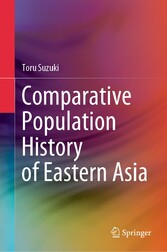Suchen und Finden
Service

Comparative Population History of Eastern Asia
Toru Suzuki
Verlag Springer-Verlag, 2024
ISBN 9789819993673 , 209 Seiten
Format PDF
Kopierschutz Wasserzeichen
Geräte
This book compares the population history of Japan, Korea, Taiwan, and China to understand such emergent changes as extremely low fertility in Korea and Taiwan, compressed urbanization and a massive diaspora from Korea, early population aging relative to economic development in China, and changing patterns of cross-border migration in the region. After discussing the origin of each ethnic group, premodern population changes are examined by reviewing historical demographic studies including those written in local languages. A new population estimation for premodern Korea is also presented.
Topics covered in this book include population growth, fertility, mortality, domestic and cross-border migration, marriage, divorce, and households. Contrasts between economic and population giants (China and Japan), former Japanese colonies (Korea and Taiwan), feudalism and Confucianism (Japan and others), and capitalism and socialism of the same ethnic groups (South and North Korea, Taiwan, and China) provide a fresh view of population dynamics in relation to political, economic, and cultural changes.
The population study of Eastern Asia has great importance. If economic development is checked by early and rapid aging, it functions to preserve the conventional Euro-centric world system and Pax Americana. On the other hand, if China succeeds in further development while sustaining a socialist dictatorship, it is a challenge to the authority of liberal democracy. If the institution of marriage remains robust and extramarital births do not increase in Eastern Asia, it implies that an aspect of family change is culturally dependent. This book provides clues to help answer such important questions.
Toru Suzuki, National Institute of Population and Social Security Research
Shop


